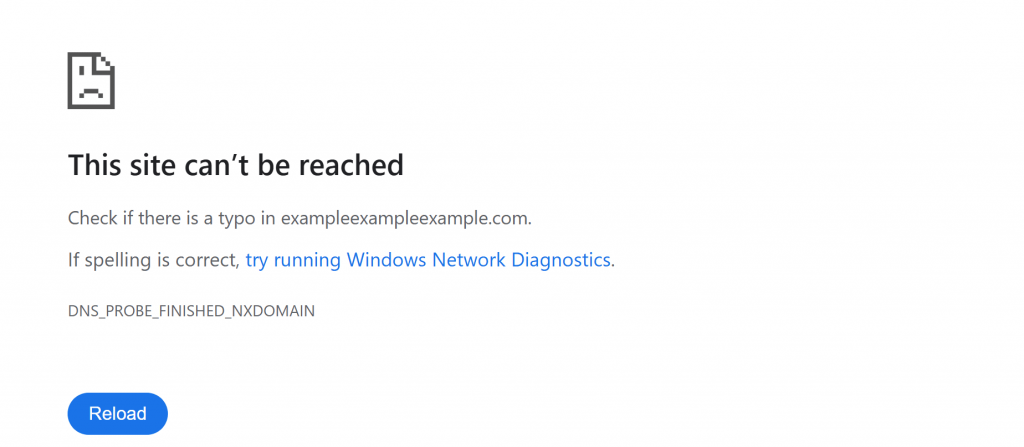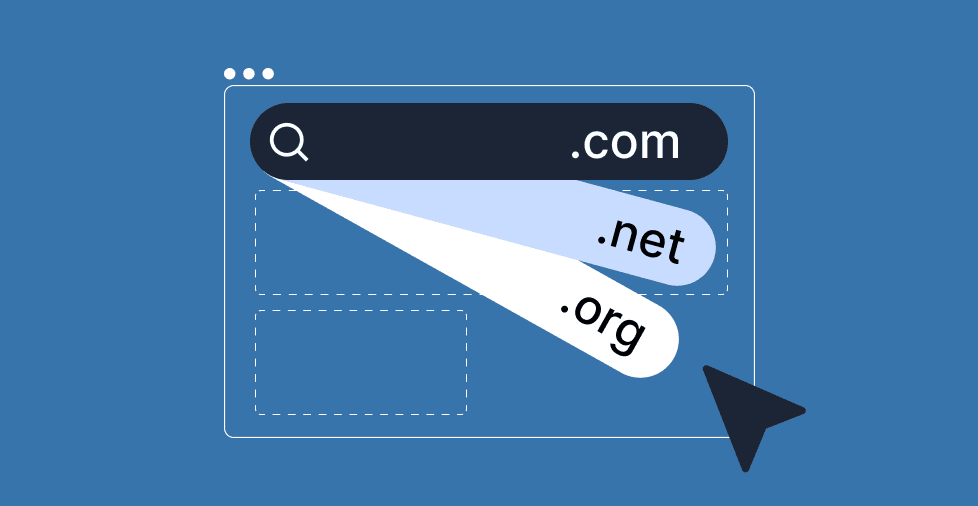Key takeaways:
- A parked domain is one that’s registered but not actively connected to a website or email host.
- Hosting providers define parked domains as additional domains pointing to a primary domain—the one linked to your site.
- Many parked domains are held for future use, like reselling or launching a new business. To help cover renewal costs, some domain owners use domain parking services to generate revenue while the domain sits idle.
So, you’ve finally secured a good domain. That’s a solid first step. But what if you’re not quite ready to launch your site?
You’re not alone. Many domain owners park their domains while they figure things out—and that’s completely normal.
Still, a parked domain doesn’t have to sit idle. Stick with us as we break down what domain parking is and how you can make the most of it while your site is still in the works.
What is a parked domain?
A parked domain is a domain name you’ve already registered but aren’t actively using. Technically, any new domain is a parked domain so long as it isn’t connected to a website or email host.
However, hosting service providers are now using terms like “addon” and “parked domain” to describe how extra domains are set up inside your hosting account.
What’s the difference between an addon domain and a parked domain?
If you already have a hosting account or you’re looking into one, you’ll notice that even higher-tier packages often come with just one free domain. That’s usually enough when you’re just getting started but later on, you might want to buy other domains. Multiple websites are purchasing domains for branding, redirects, or even to launch a second site.
That’s where addon and parked domains come in. Here’s what they mean:
Parked domains
For hosting providers, parked domains are extra domains added to the same hosting account. These are registered alongside your primary domain and don’t host separate content.
Let’s say you have a domain linked to your website and email. You then buy a few more unused domains under that same hosting account. If those point to the same website, they’re considered parked domain names.
Many parked domains fall under this category, as brands often purchase misspelled domains or close variations to protect their identity.
Addon domains
Addon domains, on the other hand, are domains you buy to use independently. Each one can act as its own primary domain name, with a separate website and email host linked to it.
What does a parked domain look like?
A parked domain page can look different depending on your domain registrar. Some might show a blank page, but more often you’ll see:
- an “under construction” or “coming soon” message
- a placeholder page
- a 404 error
- a “this domain is expired” notice
- a simple “this domain is parked” message
- or general advertisements
That said, these elements aren’t exclusive to parked domains. Legitimate websites can also show 404 errors, display ads, or use placeholder content during development.

If you want to know whether a domain is simply parked or if no one owns it at all, the best way to check is by running a Whois lookup. This will show whether the domain has been registered and who owns it.
Why park a domain?
You might be wondering why you should even park a domain in the first place. Sure, it’s free. But you’re not earning from it either unless you sign up for domain parking services. Still, parking a domain has its perks. You can use it to:
- Secure a valuable domain name
- Prevent hackers from cybersquatting
- Pursue domain investing
- Wait for a domain to expire
We’ve covered these in more detail in the next sections.
Secure a valuable domain name
You come across a great domain name, but you’re not sure what to do with it just yet. So why wait and risk someone else grabbing it? Once you register it, you can leave it parked as long as you keep up with renewals.
While others could still challenge it through trademark laws, domain registrations often discourage people from trying.
Prevent hackers from cybersquatting
Cybersquatters are opportunists who register domain names similar to yours just to block you from using them. And if you want them back? They’ll ask for a premium.
Domain owners can fight it, but the process can take up to 60 days. In that time, these hackers could do a lot of damage. Even with valid domain registrations, it’s not always a quick win. This is why many website owners choose to pay the ransom rather than risk the fallout.
To avoid that, it’s much safer and more affordable to register those variations right away. Even if you just keep them parked under your account, they’ll stay out of reach. You can also configure null MX records for these registered domains to help prevent others from spoofing your domain or sending fake emails under your name.
Pursue domain investing
The longer you hold on to a domain, especially one with strong potential, the more likely it is to grow in value. It’s a long-term investment, but if you’re patient, it can definitely pay off.
Selling a parked domain is a relatively low-risk and legitimate way to earn online. Some domain investors make thousands each month by flipping multiple names. Just make sure the domains you buy aren’t tied to trademarked brands. Otherwise, you could run into cybersquatting issues.
If domain investing sounds interesting, here are a few tips to help you get started:
- Follow trends. Stay updated on popular topics and growing industries. This will make it easier to spot domain names that could rise in value.
- Go for short and brandable names. Domain names that are easy to remember, spell, and market often attract the most attention. A good trick is to check top-selling products and pull relevant keywords to guide your ideas.
- Stick to trusted extensions. Buy multiple domains with popular extensions like .com, .net, and .org. These are more familiar to users and tend to attract more traffic. Even if you don’t land a premium domain name, you’re more likely to get better resale value with these trusted extensions.
- Watch for recently expired domains. Some expired domains still carry SEO value from backlinks on high-authority sites, making them great additions to your portfolio. Just be careful. Since they were once tied to active brands, they’re more likely to come with trademark issues.
- Use domain marketplaces. Sell your parked domains where potential buyers are already looking. Auctions and trusted marketplaces may charge a commission, but they also provide a secure environment that helps build buyer confidence.
Do note that while domain investing can be exciting, it often takes time. It could be months or even years before you see a return. Still, a parked domain can grow significantly in value over time.
Take business.com, for example. It was sold for $7.5 million in 2007. Eight years later, its value had skyrocketed to $345 million when it changed hands again.
Wait for a domain to expire
If you fail to renew your registration, your domain registrar will turn it into a parked domain. While they’ll give you a short grace period to recover it, the parked status signals to others that the domain may soon become available again.
Disadvantages of a parked domain name
Before you jump into purchasing multiple domain names just to end up parking them, it’s important to consider the drawbacks of using a parked domain such as the:
- Lack of active branding
- Limited potential for search engine optimization (SEO)
- Risk of losing a parked domain
Let’s explore these potential downsides further so you can make an informed decision.
Lack of active branding
Unless your domain registrar displays a “Coming Soon” or “Under Construction” message, there’s no clear sign that your website is in progress. Most parked domain pages show generic ads or error messages, which do nothing to represent your brand.
If you’re sure about launching your site, it’s better to take your domain out of park. Even a single web page with your logo, a short message, or contact info can help establish your brand early. It shows visitors that something is coming and gives your domain a more professional look than a generic parked page.
Limited potential for search engine optimization (SEO)
A parked domain isn’t an active website, so it won’t be indexed by search engines. That means you won’t gain any SEO value or organic traffic from it. If you already have a primary domain name, the most you can do is take your domain out of park and redirect it to your main site.
Even if your parked domain displays a “Coming Soon” or “Under Construction” message, visitors won’t have anything to engage with. And if your domain registrar decides to display ads, it can make the page seem spammy, especially to users who were expecting a real website. This lack of substance can hurt your domain’s credibility in the long run.
Risk of losing a parked domain
A parked domain isn’t completely safe. A domain owner risks losing a parked domain if it expires. Renew your domain registration on time or set your payments on auto renewal. Make sure to check the guidelines of your domain registrar or web hosting provider too. Some offer ways you can avoid losing an expired domain such as domain expiration protection.
How to earn money through domain parking
There are two main ways to generate revenue from a parked domain. You can use domain parking services or work with a domain marketplace.
Domain parking services
Unlike your registrar’s default parking setup, domain parking services actually let you generate ad revenue. You’re not renting it out, exactly—but you do get a commission based on how many people click on or view the ads placed on your parked domain.
There are two main ways this works:
- Pay per click (PPC). You earn money whenever someone clicks on an ad displayed on your domain. These ads are usually tied to keywords related to your domain name.
- Cost per impression (CPM). This model pays you based on how many people view the page. You’re typically paid for every 1,000 impressions, even if no one clicks.
Domain marketplaces
This is where you can auction off or resell your unused domain name. While you could try selling it elsewhere, domain marketplaces are where most buyers go for private, secure transactions.
Many of these platforms also offer added tools to help boost your chances of making a sale. You’ll find features like domain appraisals, traffic insights, and the option to promote your listing for more visibility. Some even offer domain brokers who can help negotiate deals or connect you with interested buyers.
Domain marketplaces also let you customize your parked pages. You can add a “For Sale” banner, choose ad categories, and include a contact form or pricing info to attract serious buyers.
Can you park a domain you’re currently using?
You can, but it’s not the best move if it takes your website offline. Parking sends visitors to a placeholder page, which could turn them away for good.
If you’ve got extra domains you’re redirecting for brand protection, parking them can help cut down what you’re managing. Just check the traffic first. If one’s still pulling in a good amount, it might be better to keep it active.
How to park your domain
Here’s how to park your domain with Network Solutions:
- Log in to your Network Solutions account.
- Go to the Hosting section in the left-hand menu.
- Select Pointers & Subdomains.
- Choose the domain you want to park.
- Set the Pointer Type to “Park.”
- Click Save.
Unlock your unused domain’s full potential
Now that you know what domain parking is, you can hold onto your domain with confidence. Whether you’re saving it for a future project or just keeping it out of someone else’s hands, there are still ways to put it to work even if it’s not tied to a live website or email just yet.
And who knows? That parked domain might be the start of your next big idea. When you’re ready to bring it to life, we’ve got you. We’ll help you turn a good domain into something great.
Frequently asked questions
Parked domain names are those that have already been registered but are not actively used to host a website. They’re often used as a placeholder to reserve a name for future use or to generate revenue through advertising.
People park domain names for different reasons. Some want to reserve them for a future project, while others do it to protect their brand. Some even park domains to generate ad revenue or resell them later.
Yes, you can. Some domain owners use domain parking services to show ads and earn passive income. Others choose to resell unused domains through marketplaces or brokers.
Yes, parked domains are safe. Most domains start out parked when registered. But if your domain is too close to an existing brand, you might face trademark issues down the line.
Yes, all domains eventually expire. Even if it’s parked, you still need to renew your registration in time to keep it. If you don’t, it could go back into the registry and become available to others.
On its own, a parked domain doesn’t generate traffic. But if the domain was previously active, it might still get occasional visitors, especially if it has backlinks from other websites. Some domain owners use this to their advantage by signing up for domain parking services to earn revenue.
Parking a domain for free means the service is provided at no extra cost. It’s often a perk included with your domain purchase, giving you time to create a website or set up an email host. You still pay for the domain name itself but not for parking, and this free service doesn’t generate revenue.
When you land on a parked domain, it will typically display a simple generic page that says “This domain is parked,” “Under construction,” or “Coming soon.” Sometimes you might also see a list of ads related to the domain’s topic. In some cases, it might just appear as a generic error message.
You can find a parked domain’s owner by doing a Whois lookup. This is a public database that lists the owner’s contact information for any registered domain name.
You can keep a domain parked for as long as you want, as long as you continue to renew its registration with your registrar.
Domain parking is perfectly legal. People commonly park domains to reserve a name, earn ad revenue, or sell it later. The only illegal practice is called cybersquatting, which is when you register a domain name specifically to infringe on someone else’s trademark.




